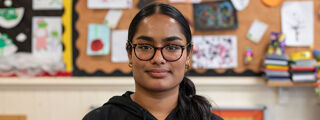BA (Hons) Early Childhood Studies student, Raman Sahota, is currently on placement within a nursery in Smethwick, Birmingham. She spoke to us about her time so far on placement, what she's learnt and how her course has helped her.
How did you secure your placement?
I was randomly assigned to my placement through the University. I received an email telling me where I'd be going and then I was invited for an induction. My placement is taking place over 25 days throughout the academic year.
What does your placement involve? What do you what do you do on a on a day-to-day basis?
I'm usually here the earliest of all the staff, so my first task is to greet the children as they arrive. This includes taking bags and coats and putting them away, then I give the kids lots of hugs to make them feel welcome and settled in for the day as separating from their caregivers can be difficult for some of them. As I'm here so early, I put activities out on the tables, and then throughout the day I'll sit with the children and do the different activities with them, making sure I move around to interact with all the children.
There's always a lot going on; in addition to the play activities, we read together, sing, have group and outside play, and snack time, which involves helping them wash their hands. There’s also a ball pit so we make sure the kids are getting up to something physical and active throughout the day whatever the weather is like outside!
How has what you've learned on your course helped you with your placement?
The Child Development module really helped me to prepare for my placement. We learnt about the different areas of development, which is something I didn't know anything about before starting the course. This module helped me notice how the children were developing and looking out for different signs where I may be able to help them progress or where they need a little extra help.
What have you learned from being on placement?
The main takeaway for me has been confidence. I haven't had that much work experience previously, so when I started my placement I had to start from scratch and build my confidence to interact with the children and the staff. Now, I've been able to lead circle time with all the children and use my own initiative to plan the activities. So, confidence is what I’ve really developed here.
Do you have any standout memories from your placement so far?
One thing that makes me really happy is that I have noticed some children start to talk more and open up to me. Some of the more vulnerable children were very quiet and kept to themselves. A few of the children wouldn't even talk to me or look at me for the first few days, and now they are hugging me and talking to me a lot more. So those relationships with the children have progressed a lot and are very special to me.
Why did you choose this course?
I think I've always wanted to work with children. When I was young, I wanted to be a teacher, and growing up I had always had in the back of my head that this is the route that I was going to take. I had a few friends who went on to study childcare and healthcare, and what I heard from them about what they were learning and how practical their course was really appealed to me. When the time came to apply to university, I was looking at all courses related to children and education, and the Early Childhood Studies course seemed perfect for me. I would love to go on to study play therapy for my master's, which BCU offers a route into through an MSc in Counselling (Children and Young People).
What aspirations do you have for the future?
Although I would eventually love to work with children as a play therapist, I would like to get some practical experience as a practitioner or a play worker first, just to have that experience and grow my confidence further. Then in the future when I’m ready to go back into education, I know I have options to come back to BCU.
Why do you think early years practitioners are important?
Being in this industry has made me realise that nursery workers are the foundation of a child's life and that education is so important. Everything that early years practitioners do with children is helping them both now and in the future with their development and communication. Even down to helping them become more social, the earliest practitioners have a very key role in that.
Some children do not have any strong or positive role models at home, so to have trustworthy adults to look up to, and to explore what more there is to life outside of what they experience at home, is so important to developing their personality and them becoming the best version of themselves they can be.
